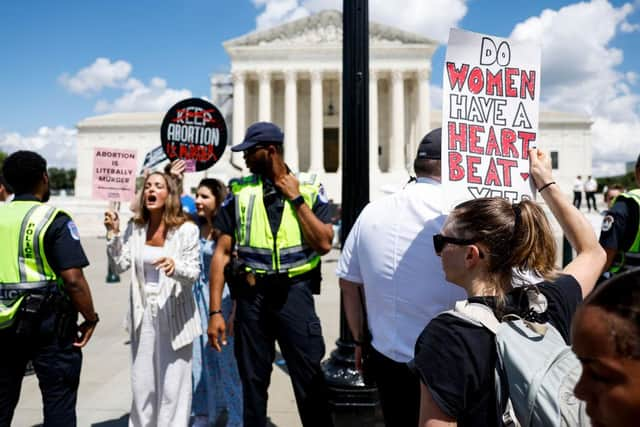Kate Cox abortion: Which countries around the world have relaxed their abortion rules and which have tightened them?
As Texan mother Kate Cox is forced to travel out of state to have an abortion of a high-risk pregnancy, an increasing number of women around the world are facing stringent abortion rules.
Ms Cox sued the state of Texas in a bid to be granted an abortion after her foetus was diagnosed with a life-threatening condition which could also threaten her future fertility has left the state to have the procedure.
Advertisement
Hide AdAdvertisement
Hide AdAccording to the Center for Reproductive Rights, around 60 per cent of women worldwide live in a country where abortion is broadly legal.


Here, we look at which countries have tightened – or are looking to tighten – their abortion laws in recent times and which have relaxed them.
Countries which have tightened abortion laws:
Russia:
Certain regions in Russia have recently brought in anti-abortion policies by stealth – ranging from outlawing the act of "coercing women" into having an abortion to banning the procedure in private clinics.
In October, legislation was approved restricting access to abortion drugs, while all private health clinics in Russian-occupied Crimea said that they will stop providing abortions entirely.
Earlier this year, two Russian regions – Mordovia and Tver – passed legislation which meant anyone found to “coerce” women into abortions would face a penalty.
US:
Since the landmark ruling of Roe vs Wade last year, 22 states in the US, including Texas, have banned abortion – some entirely, some beyond a certain point. The overturning of the case in the Supreme Court meant the legal right to terminate unwanted pregnancies was removed in the US.
Poland:
Poland rules to make abortion almost entirely illegal in 2020. Polish law now permits abortion only to safeguard the life or health of the woman or where a pregnancy results from rape or incest. The law does not criminalise having an abortion but rather anyone who provides or assists someone in having an abortion outside of highly restricted grounds.
According to the 2020 Constitutional Tribunal decision, abortion on grounds of “high probability of severe and irreversible foetal impairment or incurable illness that threatens the foetus’ life” was ruled to be unconstitutional, removing that avenue of obtaining a legal abortion.
Honduras
Advertisement
Hide AdAdvertisement
Hide AdWhile abortion has been banned in the Central American country since 1985, in 2021, lawmakers enshrined the ban in the country’s constitution, meaning that any change to abortion law requires at least a three-quarters majority in Honduras’ National Congress.
Countries which have relaxed abortion laws:
Ireland:
In Ireland in 2012, dentist Savita Halappanavar, 31, died after she was denied an abortion by doctors in accordance with the country’s strict laws, even though there was no chance her baby would survive. Six years later, a two thirds majority of the Irish public voted to legalise the procedure in Ireland in a referendum.
Argentina
Argentina relaxed its law on abortion in 2020. Under the new regulations, a woman can choose to terminate her pregnancy in the first 14 weeks, Previously, it was only allowed in the case of rape or if the woman's life or health was at risk.
Thailand
Following a 2020 ruling of the Constitutional Court which declared a portion of the abortion statutes unconstitutional, the Thai Parliament removed first-term abortion from the criminal code.
Previously, the law allowed termination of a pregnancy only when abortion was necessary due to the health of the pregnant woman, or if the pregnancy was the result of rape. Abortions performed outside of these circumstances were punishable by up to three years in jail and a fine for the woman and up to five years for the medical practitioner performing the procedure.
Since February 2021, it has been legal up to at least 12 weeks of pregnancy and is now legal up to 20 weeks.
Mexico
In September, Mexico’s Supreme Court ruled that state laws prohibiting abortion are unconstitutional and violate women’s rights.
The ruling came two years after the court ordered the state of Coahuila to remove sanctions for abortion from its criminal code, sparking a state-by-state process of legal battles. A total of 12 of Mexico’s 31 states had decriminalised the procedure as a result.
South Korea
Advertisement
Hide AdAdvertisement
Hide AdAbortion was decriminalised in South Korea by court order in 2019, to come into effect in 2021. In October 2020, the government announced draft legislation that would decriminalise abortion until the 14th week of the pregnancy. In addition, abortions between the 14th and 24th week would be permitted if the pregnancy was due to rape or for social, economic, or health reasons.
However, no new law has been enacted, leaving abortion without legal regulation.
New Zealand
Under New Zealand’s Abortion Legislation Act 2020, the criminal status of abortion was entirely eliminated. The decision, made when Jacinda Ardern was prime minister, allows termination on request during the first 20 weeks of pregnancy.
Previously, abortion in New Zealand was heavily restricted and criminalised under the Crimes Act 1961, with significant changes occurring in 1977 and 1978 to allow abortions under specific circumstances.
Comments
Want to join the conversation? Please or to comment on this article.
